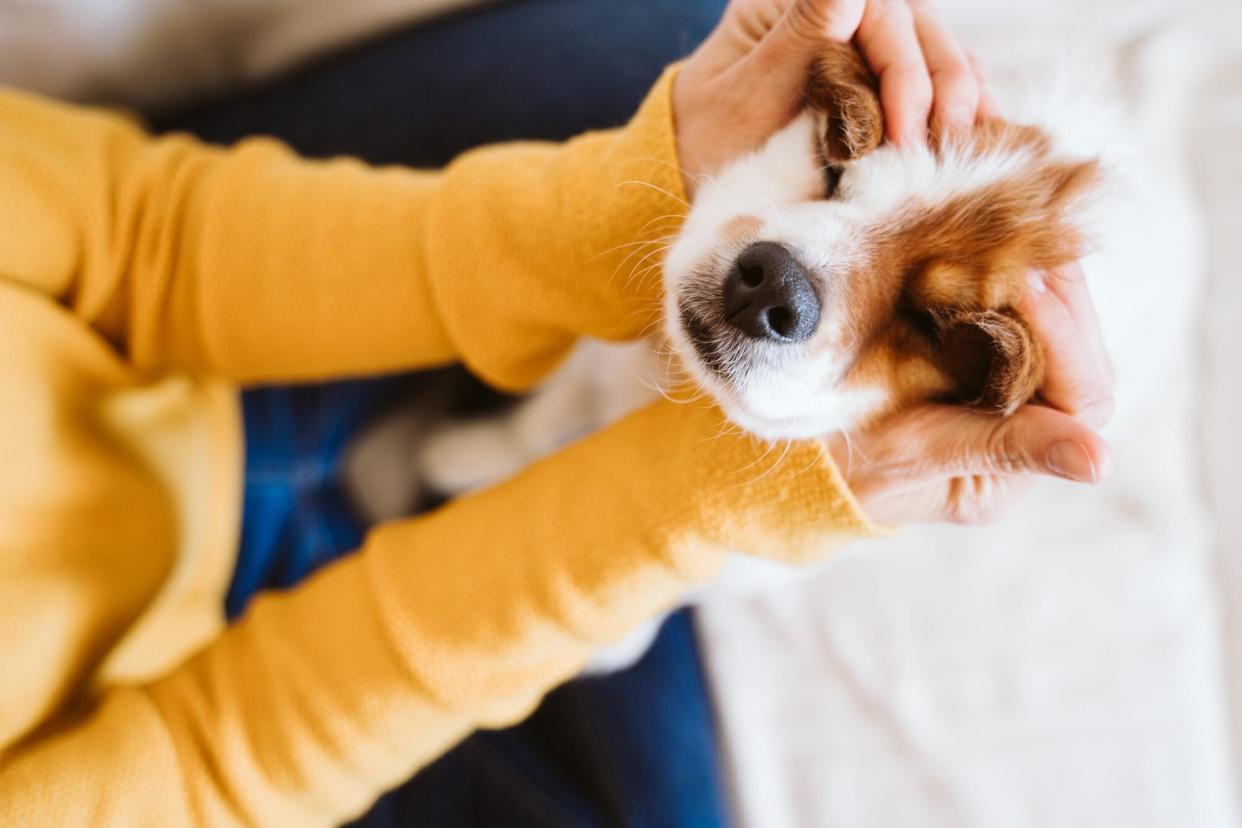Entropion in Dogs: Causes, Symptoms, and Treatment to Give Your Pup's Irritated Eyes Some Relief

Eva / Getty
If you notice your dog constantly pawing at their eyes, you might need to have them checked for entropion, a condition where inward rolling of the eyelids can cause a lot of discomfort and eye damage for your pup. If this doggie ailment is one that you've not yet heard of, read on to learn more about what entropion is, what symptoms to look for, and what treatment options are possible.
What Is Entropion in Dogs?
Entropion—which can in fact affect humans, dogs, and cats—is a condition where there is an inward rolling of one or both eyelids. "This results in the hair or skin around the eyelids rubbing on the eye structures like the cornea and conjunctiva, which can cause eye irritation and discomfort," says Jo-Ann McKinnon, DVM, ophthalmology specialist at VCA Regional Institute for Vet Emergencies and Referrals hospital, in Chattanooga, Tenn. "Any part of the eyelid could be rolled in, such as the medial or lateral part of the eyelid or the entire eyelid."
Even though entropion is a disease that primarily affects the lower eyelids, McKinnon notes that the upper eyelids may also be affected, especially in heavy-browed breeds like the Shar-Pei and the Chow Chow.
This condition is typically identified in puppies under one year of age. There are several underlying causes for entropion, including developmental and breed predisposition where both eyes are typically affected. "This condition may also develop secondary to another painful eye disease such as a corneal ulcer, in which case only one eye is affected," McKinnon explains.
What Are Symptoms of Entropion in Dogs?
Whether your dog is genetically predisposed to develop entropion or it was caused by another eye ailment, the symptoms of entropion are similar to the symptoms associated with any disease causing eye irritation, discomfort, and pain, including:
Excessive tearing making their face wet
Your dog rubs at their eyes
Redness of the eyes
Swelling
Eye discharge
"Due to the chronic irritation of the hair and skin on the eye surface, cornea, and conjunctiva, the dog may not want to open their eyes to prevent the pain and discomfort created by the irritation during normal blinking," adds McKinnon. On the other hand, it may cause excessive blinking as the dog tries to deal with the irritation, kind of like when you have an itchy rash and aren't able to stop yourself from scratching.
If left untreated, entropion can cause complications for your dog's eyes, including corneal ulcers which could potentially negatively impact vision and the overall health of the eye, McKinnon cautions.
Treatment for Entropion in Dogs
If any or all of these symptoms are noticed, McKinnon says you should consult with a veterinarian as soon as possible to determine the underlying cause. Injuries to eyes can turn serious very quickly, so if you see something—or your pup is having trouble doing so—say something.
You will start with an eye exam. "If entropion is present, your veterinarian will examine the conformation of the eyelids and investigate if this is a developmental problem or if there is any other eye disease that may be causing the eyelids to roll inward," McKinnon says. Your vet will likely also check for any damage to your dog's cornea that may have happened.
If the entropion is a genetic condition with no other underlying eye disease, then surgery is necessary to reposition the eyelids in their normal position. But don't fret if your dog needs to have surgery. This procedure is called blepharoplasty—a type of plastic surgery—and your vet works to reshape the eyelid so it will no longer roll inward. The cost for this procedure can range anywhere form $500 to $1,500 depending on a number of factors, including who performs it.
"Prior to surgery, an ophthalmic lubricant may be temporarily used to provide cushioning between the hair and the eye structures which are being irritated," McKinnon says. "If the dog is very young, a temporary tacking procedure may be recommended prior to a more permanent surgical corrective procedure," she adds, noting that as your pup grows older, they may grow out of the condition.
If the entropion is being caused by another eye disease, your vet will work to resolve the underlying condition which may in turn help correct the entropion without your dog having to have surgery to reposition the eyelid. If the entropion caused any corneal ulcers, those will need to be treated as well.
And while this is certainly not an enjoyable ordeal for you or your pet to go through, you can feel some reassurance that whether your dog's entropion was caused by an underlying disease or because of their genetics, the prognosis for a full recovery for your pooch is excellent.

